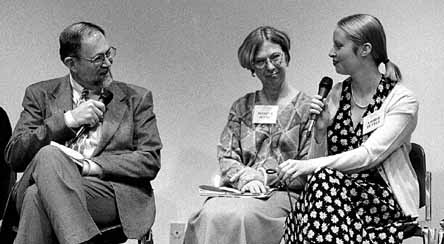Hall’s first diversity forum focuses on women
Utah State University President Kermit L. Hall pledged that within one year concrete measures will be taken to improve the climate for women on campus in which equality is the touchstone.
In the 16th president’s diversity forum, a panel of representatives of faculty, staff, students and community members discussed gender issues USU faces.
Opening with a reading of scenes from the play “Top Girls,” written in 1982, the panel continued role playing. The play addressed issues of age, aggression and women promoted over men.
Through the panel, attitudes toward women and gender roles were brought out. In the case of a woman being promoted over a man, the idea of a man having to support a family and a woman working for material reasons was brought out.
Pam Riley, professor in the Sociology, Social Work and Anthropology department, said today many women in the workforce would rather not be there.
“Most women are working for the same reason men are,” which is to feed their children, Riley said.
Another scene in the play sparked discussion of the age of women being a handicap. In the play, the character Louise, a 46-year-old reserved woman, was looking for a new job. During the panel discussion, Adrianne Moore, an assistant professor who played Louise, said the character had to work harder to keep up.
“I have to be 150 percent better than my closest male rival,” Moore said of her character Louise.
Rep. Loraine Pace, a Republican representing Utah’s 4th District in the state Legislature, said sometimes staying silent when women shouldn’t can add to the problem.
Caryn Beck-Dudley, department head of Management and Human Resources, said although she considers herself a fun person who is not easily offended, when someone uses off-color language, jokes or rumors, she calls him or her on it.
“I’m not a walk-away kind of person,” Beck-Dudley said.
Being respectable as a stay-at-home wife and mother was also discussed.
“If a woman can stay at home and raise up her children to be good citizens of the United States, the more power to her,” said Mava Pitcher, a systems operations technician in central distribution.
Bonita Wyse, dean of the College of Family Life, said the same could be true of men who elected to stay home with their children.
Moore said the workforce should respect the experience as a homemaker many women entering the workforce in their later years have.
Pace said being a homemaker gives a variety of experiences and opportunities for community hours and helped prepare her for the Legislature.
“It doesn’t slow you down on anything,” Pace said.
Hall mentioned several statistics of progress in gender equality, but the panel all agreed more work must be done.
Mary Leavitt, director of the Science and Humanities, Arts and Social Sciences advising center, said retaining strong women should be a goal at the top. Beck-Dudley said gender issues need to be worked on from a lot of different fronts, not just one or two.
Tom Kent, dean of Graduate Studies, said the administration needs to provide a good example for students.
Ann Aust, professor of chemistry and biochemistry, said most times there isn’t an intent to exclude women, but information seems to travel more easily between men, especially in her field, where she said 10 percent women is considered high.
It requires an extra effort to make information available and include women in it, Aust said.
Riley said she is optimistic about changes in attitude she has seen among her male colleagues.
“Now we can move on to bigger things,” Riley said, like increasing the number of assistant professors at Utah State, which she said was under 10 percent.
As the forum ended, Hall promised it was the beginning, not the end, of the discussion.

